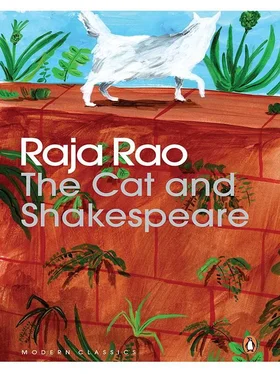Rao Raja - The Cat and Shakespeare
Здесь есть возможность читать онлайн «Rao Raja - The Cat and Shakespeare» весь текст электронной книги совершенно бесплатно (целиком полную версию без сокращений). В некоторых случаях можно слушать аудио, скачать через торрент в формате fb2 и присутствует краткое содержание. Год выпуска: 2014, Издательство: Penguin, Жанр: Современная проза, на английском языке. Описание произведения, (предисловие) а так же отзывы посетителей доступны на портале библиотеки ЛибКат.
- Название:The Cat and Shakespeare
- Автор:
- Издательство:Penguin
- Жанр:
- Год:2014
- ISBN:нет данных
- Рейтинг книги:4 / 5. Голосов: 1
-
Избранное:Добавить в избранное
- Отзывы:
-
Ваша оценка:
- 80
- 1
- 2
- 3
- 4
- 5
The Cat and Shakespeare: краткое содержание, описание и аннотация
Предлагаем к чтению аннотацию, описание, краткое содержание или предисловие (зависит от того, что написал сам автор книги «The Cat and Shakespeare»). Если вы не нашли необходимую информацию о книге — напишите в комментариях, мы постараемся отыскать её.
The Cat and Shakespeare — читать онлайн бесплатно полную книгу (весь текст) целиком
Ниже представлен текст книги, разбитый по страницам. Система сохранения места последней прочитанной страницы, позволяет с удобством читать онлайн бесплатно книгу «The Cat and Shakespeare», без необходимости каждый раз заново искать на чём Вы остановились. Поставьте закладку, и сможете в любой момент перейти на страницу, на которой закончили чтение.
Интервал:
Закладка:
I am empty as a tamarind seed,
The lord plays the square and
four with me.
That is right. When you are reminded that you are empty as a tamarind seed, you see it and say it again, you know the tamarind seed is empty. And begin to think of the play. And where play begins, reality begins. Reality is only where you go to prison and say, close the door and open the door. Any door can open and any door can close. What is special about a prison door that you call it prison door? In dream you must have gone to a house from which you could not escape. The staircase fell off and the upper wall had gone somewhere. On waking up, do you say, I am falling, I am falling? You say, I played in the dream. You go to the office and go up the staircase with the ration shop below (and its huge scale), and you put your coat down and sharpen your pencil and say: Let me look into the Ummathur file. Then suddenly you remember that in the dream Bhoothalinga Iyer was shouting, “Nair, Nair, I missed my train to Coimbatore. What shall I do?” Did he miss his train to Coimbatore? Is that what he wanted to say on getting up and sitting on his pyre? Where has he gone? Where has Bhoothalinga Iyer gone? Lord, do you know?’ etc., etc.
There is no argument against a man like Govindan Nair, who will bring a staircase from his dream to prove that Bhoothalinga Iyer has gone to Coimbatore. His further argument is: Prove to me that Bhoothalinga Iyer is not in Coimbatore.
You may say he is talking nonsense. No sir, he is talking sense. You never saw a man talk more sense than Govindan Nair. Even Usha says she can understand him. I cannot. Shantha can, and the cat seems to understand. But I read The Hindu too much, that is the trouble with me, and I cannot understand. What can Malayalarajyam say, except what its correspondents see? But Govindan Nair talks of only what he sees. That means he does not talk. And this is the secret of his state.
The white-clad judge, Mr Gopala Menon, said in the palace-like court by the railway line which every advocate knows so well — the name-boards of the advocates look like coconuts on a tree, there are so many in the building across: Vishwanatha Iyer, BSc, LLB; Ramanujan Iyengar, MA, ML, Advocate High Court; Mr Syed Mohammed Sahib, Advocate; R. Gangadharan Pillai, High Court Advocate; S. Rajaram Iyer, Advocate; etc., etc. — the judge said: ‘I cannot follow your argument, sir. Will you repeat?’
‘Mr Bhoothalinga Iyer, of blessed memory,’ Govindan Nair started, ‘used to visit certain places whose names are not mentioned in respectable places.’ (‘Ho, ho!’ shouted one or two persons in the gallery.) ‘If I do not mention the name, it is because many persons whose faces I see before me now, if I may say so, betake themselves there.’
‘My Lord, such insinuations are not to be permitted in open court,’ shouted a member of the bar.
‘The sun shines on the good and on the wicked equally, like justice. Please go and close the sunshine before you say: this should not be discussed in open court.’
Court: ‘The Accused is free to do what it likes.’
‘I was only saying: Whether you close the door and sit like photographers in the darkroom or you come out, the sun is always open. The Maharaja of Travancore, sir—’
‘Say His Highness.’
‘Yes, His Highness the Maharaja of Travancore is there, whether his subjects — say some fellow in the hill tribes — knows his name or not.’
‘So?’
‘So what is real ever is.’
‘That is so,’ cried the Government Advocate.
‘Yes, but we never want to see it. For example, that a worthy man like Bhoothalinga Iyer (of blessed memory) used to visit places of little respectability.’
‘So?’
‘So, he met there, one day, a lady of great respectability.’
‘Your statements are so contradictory.’
‘Your Lordship, could I say Your Lordship without the idea of an Accused? Could I say respectable without the ideas of unrespectable coming into it? Without saying, I am not a woman, what does the word man mean?’
‘Yes, let us get back to Bhoothalinga Iyer.’
‘Mr Iyer used to visit such a place.’
‘And then?’
‘One day after visiting such a place, he met me at the door.’
‘Yes, go on. Did he?’
‘Of course. I went there regularly. My wife will tell you.’
‘Oho,’ exclaimed Advocate Tirumalachar from the bar table.
‘And at the door he said: “Every time I commit a sin, I place a rupee in the treasure pitcher of the sanctuary. I tell my wife this is for me to go to Benares one day. But the treasure pitcher is tightly fixed with sealing wax. There is here in this place a respectable woman. I like her and she likes me. When I went in, as usual, this time, however, a new woman, a Brahmin woman, I think an Iyengar woman, came. She said her husband was dead. I knew I was going to die soon, being old. But I was in a hurry. So I told her: Do not worry, lady. I will go and tell your husband everything. He will understand. She became naked and fell on the bed. Her breasts were so lovely.”’
‘This is sheer pornography,’ said an elderly advocate with a big nose.
‘I am quoting evidence, Sir,’ continued Govindan Nair.
‘And she played with her necklace that lay coyly on her bosom.’
‘And what did he do?’ asked a counsel for the Government.
‘He did nothing.’
‘Ha, ha, ha,’ laughed many of the advocates.
‘The dignity of the Court demands better behaviour,’ said the Government Advocate. He had never had to argue against so strange a man. He got terrifically interested in his opponent.
‘He not only did nothing, sir. Mr Bhoothalinga Iyer was a man of generous heart—’
‘To propose immorality as a generous thing!’ mumbled Advocate Tirumalachar. Tirumalachar, who looked fiftyish and fair, was known for his deep religious sympathies. He was president of the Radha-Soami Sangh, Trivandrum.
‘What do advocates defend?’ asked the judge.
‘Morality,’ said Tirumalachar, rising and adjusting his turban.
‘You defend man,’ said the Government Advocate. ‘But law says we defend the Truth. The law is right.’
‘The Government Advocate has said the right thing. Now, Accused, continue.’
‘My Lord, I was saying: One day after the whole office was empty and Bhoothalinga Iyer was alone, he said: “Govindan Nair, stay there. I have a job for you.” And he produced the Benares pot that he had hidden deeply in the sample rice sack. There was one sack always in the office. Who would look into it? So he produced the Benares pot and said: “Go to Mutthalinga Nayak Street and in the third house right by the temple Mantap there must be a widow called Meenakshiamma. Please hand over this one hundred and nine rupees. That is all there is in it. I told my wife yesterday to go to the cinema with my son-in-law. She went. I stole this and came here. I opened the office. I had the key. Today I have sent her to the zoo with my son-in-law. Then there is Pattamal’s music at the Victoria Jubilee Hall. Therefore they will come late, but I must return home quietly. I know you are a man with a big heart, so please do this service for me. She will wait for you.”’
‘In English you call this a cock-and-bull story,’ said Tirumalachar.
‘You could, if you so want, call it a hen-and-heifer story,’ said Govindan Nair, and laughed.
‘Who then was the witness?’
‘As one should expect in such a cock-and-bull story, a cat, sir, a cat,’ said Govindan Nair seriously.
The Judge rose and dismissed the court. He called the accused, and said: ‘Please speak the truth.’
And Govindan Nair, with tears running down from his big black eyes, answered: ‘Your Lordship, I speak only the truth. If the world of man does not conform to truth, should truth suffer for that reason? If only you knew how I pray every night and say: “Mother, keep me at the lotus feet of Truth. The judge can give a judgement. The Government Advocate can accuse. Police Inspector Rama Iyer can muster evidence. But the accused alone knows the truth.’
Читать дальшеИнтервал:
Закладка:
Похожие книги на «The Cat and Shakespeare»
Представляем Вашему вниманию похожие книги на «The Cat and Shakespeare» списком для выбора. Мы отобрали схожую по названию и смыслу литературу в надежде предоставить читателям больше вариантов отыскать новые, интересные, ещё непрочитанные произведения.
Обсуждение, отзывы о книге «The Cat and Shakespeare» и просто собственные мнения читателей. Оставьте ваши комментарии, напишите, что Вы думаете о произведении, его смысле или главных героях. Укажите что конкретно понравилось, а что нет, и почему Вы так считаете.












